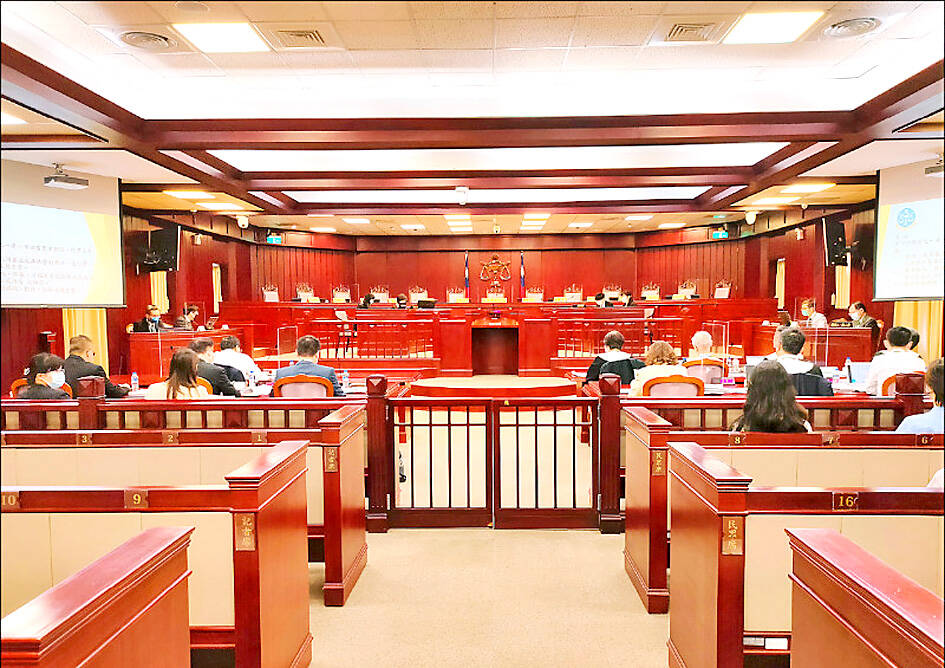The Constitutional Court is next month to start the process of handling a constitutional challenge calling for the use of swear words to be decriminalized in connection with public insults.
The challenge was brought by prominent figures involved in related lawsuits, such as media personality Neil Peng (馮光遠), author Chang Ta-chuen (張大春) and sports agent Yang Hui-ju (楊蕙如).
Peng was found guilty of public insult and fined NT$5,000 after calling former National Security Council secretary-general King Pu-tsung (金溥聰) “a rotten egg,” “scum” and a “sleazebag” in 2015.

Photo: Taipei Times file
Chang had to pay a fine of NT$3,000 after being was found guilty of public insult for saying that media personality Liu Chun-yao (劉駿耀) had a head “full of shit,” and was “sleazy” and “shameless” in 2015.
Yang was found guilty of insulting a public official after instructing a man surnamed Tsai (蔡) to post messages online criticizing diplomatic officials at Taiwan’s representative office in Osaka, Japan, for their alleged failure to assist Taiwanese passengers stranded at Osaka Kansai International Airport during a typhoon in 2018.
Yang last year paid a NT$150,000 fine in lieu of serving a five-month sentence.
She is among eight plaintiffs challenging the offense of insulting a public official, saying it infringes on her freedom of speech.
The offense falls under Article 149 of the Criminal Code, and those found guilty of it can be sentenced to up to one year in prison and fined up to NT$100,000.
Thirty plaintiffs are challenging the public insult offense. Most of them were convicted under Article 309 of the Criminal Code, which imposes a fine of up to NT$9,000.
Some of the cases involved the utterance of obscene terms, colloquial expletives or other slurs such as “slut” or “idiot.”
Judicial Yuan President Hsu Tzong-li (許宗力), who heads the Constitutional Court, said that the oral arguments on public insults and insulting a public official would be heard on Dec. 25 and 26 respectively.
By law, a ruling must be made within three months of that date, although a two-month extension can be granted.
Before becoming president of the Judicial Yuan in 2016, Hsu in 2012 criticized the authorities and courts for indicting people for insulting others.
Hsu at the time recommended a review, saying the courts should interpret tarnishing of one’s character and dignity as relating to hatred “based on race, religious beliefs, gender and sexual orientation.”
More common insults such as the use of expletives during disputes, although they could hurt someone’s feelings, should not be an issue court should have to deal with, Hsu said.

The Ministry of Education (MOE) is to launch a new program to encourage international students to stay in Taiwan and explore job opportunities here after graduation, Deputy Minister of Education Yeh Ping-cheng (葉丙成) said on Friday. The government would provide full scholarships for international students to further their studies for two years in Taiwan, so those who want to pursue a master’s degree can consider applying for the program, he said. The fields included are science, technology, engineering, mathematics, semiconductors and finance, Yeh added. The program, called “Intense 2+2,” would also assist international students who completed the two years of further studies in

Former president Tsai Ing-wen (蔡英文) departed for Europe on Friday night, with planned stops in Lithuania and Denmark. Tsai arrived at Taiwan Taoyuan International Airport on Friday night, but did not speak to reporters before departing. Tsai wrote on social media later that the purpose of the trip was to reaffirm the commitment of Taiwanese to working with democratic allies to promote regional security and stability, upholding freedom and democracy, and defending their homeland. She also expressed hope that through joint efforts, Taiwan and Europe would continue to be partners building up economic resilience on the global stage. The former president was to first

Taiwan will now have four additional national holidays after the Legislative Yuan passed an amendment today, which also made Labor Day a national holiday for all sectors. The Chinese Nationalist Party (KMT) and Taiwan People’s Party (TPP) used their majority in the Legislative Yuan to pass the amendment to the Act on Implementing Memorial Days and State Holidays (紀念日及節日實施辦法), which the parties jointly proposed, in its third and final reading today. The legislature passed the bill to amend the act, which is currently enforced administratively, raising it to the legal level. The new legislation recognizes Confucius’ birthday on Sept. 28, the

MORE NEEDED: Recall drives against legislators in Miaoli’s two districts and Hsinchu’s second district were still a few thousand signatures short of the second-stage threshold Campaigners aiming to recall Chinese Nationalist Party (KMT) legislators yesterday said they expect success in 30 out of 35 districts where drives have passed the second-stage threshold, which would mark a record number of recall votes held at once. Hsinchu County recall campaigners yesterday announced that they reached the second-stage threshold in the recall effort against Legislator Lin Szu-ming (林思銘). A total of 26,414 signatures have been gathered over the past two months, surpassing the 10 percent threshold of 23,287 in Hsinchu County’s second electoral district, chief campaigner Hsieh Ting-ting (謝婷婷) said. “Our target is to gather an additional 1,500 signatures to reach